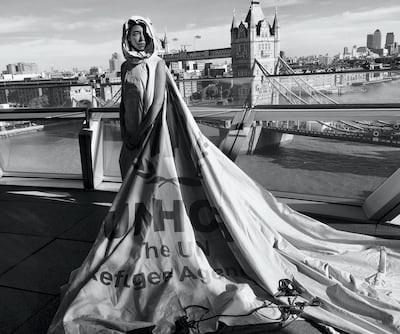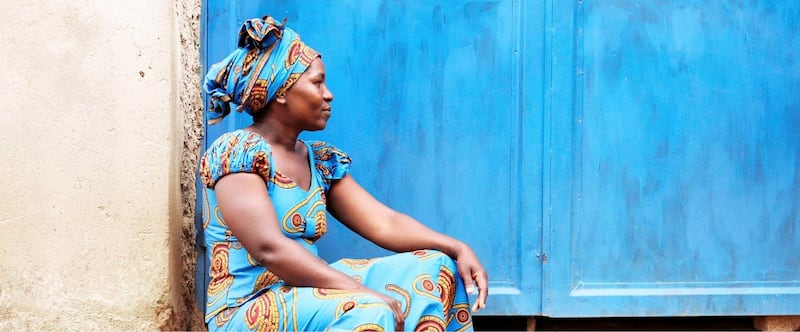Fashion and the refugee crisis may sound like unlikely partners, but a number of enterprises work with refugees to help ensure they have the skills to earn a fair wage and the opportunity to sell the fruits of their labour. The UN refugee agency estimates there are currently 70.8 million people worldwide who have been forcibly displaced due to persecution, conflict and violence. That amounts to one person every two seconds, and is the highest level on record.
Helen Storey
Helen Storey is an award-winning British designer who uses the power of fashion to communicate some of the world's most complex issues, one of which is the mass displacement of people. Storey, who is also an artist and researcher, currently works at the London College of Fashion. Her creation, Dress for Our Time, was made from a UNHCR tent that once housed a Palestinian family at the Za'atari refugee camp in Jordan.

The gown, intended to symbolise the precarious nature of our existence, has so far been exhibited at Buckingham Palace, London's St Pancras train station, Glastonbury music festival and Dubai's DIHAD aid and development conference. While this dress is unique, with its flowing train adorned with the UN logo, it is far from the only example of fashion and refugees working together to spark discussion and posit responses to this humanitarian crisis.
SEP in Jordan
SEP is a social enterprise based in Jordan, with a flagship store in Geneva, Switzerland, which produces a range of fashion accessories and home products. All SEP products are made by artists and refugees in Jordan's Jerash refugee camp. Gazan women trained at the Tamari Foundation produce a range of delicate, hand-embroidered accessories, embellished with traditional geometric patterns inspired by Islamic architecture and Palestinian heritage.
The collection features hand-embroidered shawls, scarves, wraps, ponchos and bags, all featuring cross-stitched multicoloured embroidered bands and borders. A highlight of the collection is the Jordanian and Palestinian kaffiyeh scarf, intended to transcend politics, religion and cultural boundaries to simply support those in need through honest labour and home-grown skill.
Indego Africa
Indego Africa works with Burundian refugee women in Rwanda to create a range of colourful bucket bags, totes, purses, hats and children's clothing, as well as homeware. Each piece is handcrafted using time-honoured heritage techniques, including raffia weaving, wood carving, embroidery and beading.
This social enterprise collaborates with artisans to create items that support their talent and showcase the storied history of traditional African artistry through contemporary design. Indego Africa is a non-profit organisation that invests heavily in training, to enable refugee artisans to start careers and grow their own business. The educational programmes it offers address the unique financial challenges refugee women face by providing them with training as well as market access.
Working with women from the Mahama and Kigeme camps in Rwanda, Indego Africa helps refugees integrate into their host countries' workforce to achieve long-term security and success for themselves, as well as their families, by helping them create brighter economic futures.
Knotty Tie
Founded as a social enterprise, Knotty Tie makes men's ties, scarves and pocket squares in the US. Not, perhaps, either the product or location that first spring to mind when thinking of refugee support. Nevertheless, the team's mission is to provide skills-based employment with fair wages and benefits for resettling refugees. They help recent immigrants assimilate and attain economic self-sufficiency as quickly as possible, through making high-quality, meaningful products. The company also provides reimbursement for college coursework, while helping refugees navigate community resources, and paying for transport and healthcare.
The company's training programme starts with basic sewing and includes graphic design training, technology and management. Paid a living wage, as opposed to a minimum one, Knotty Tie employees come from a variety of countries, including Rwanda, Syria, Iran, Jordan, Cameroon, Mauritania, Eritrea and Somalia.
Each of these partnerships is founded on the principle of making a difference and helping people, as well as enabling customers to do this through their purchases. They all just go to show that even a small company can have a major impact.
_________________
Read more:
How Lebanese clothing label Emergency Room plans to be an alternative to fast fashion
Craftivism: how crafting can be used as a means of action and activism
Weaving into a new age: how the world's oldest surviving craft gets a fresh spin
_________________





